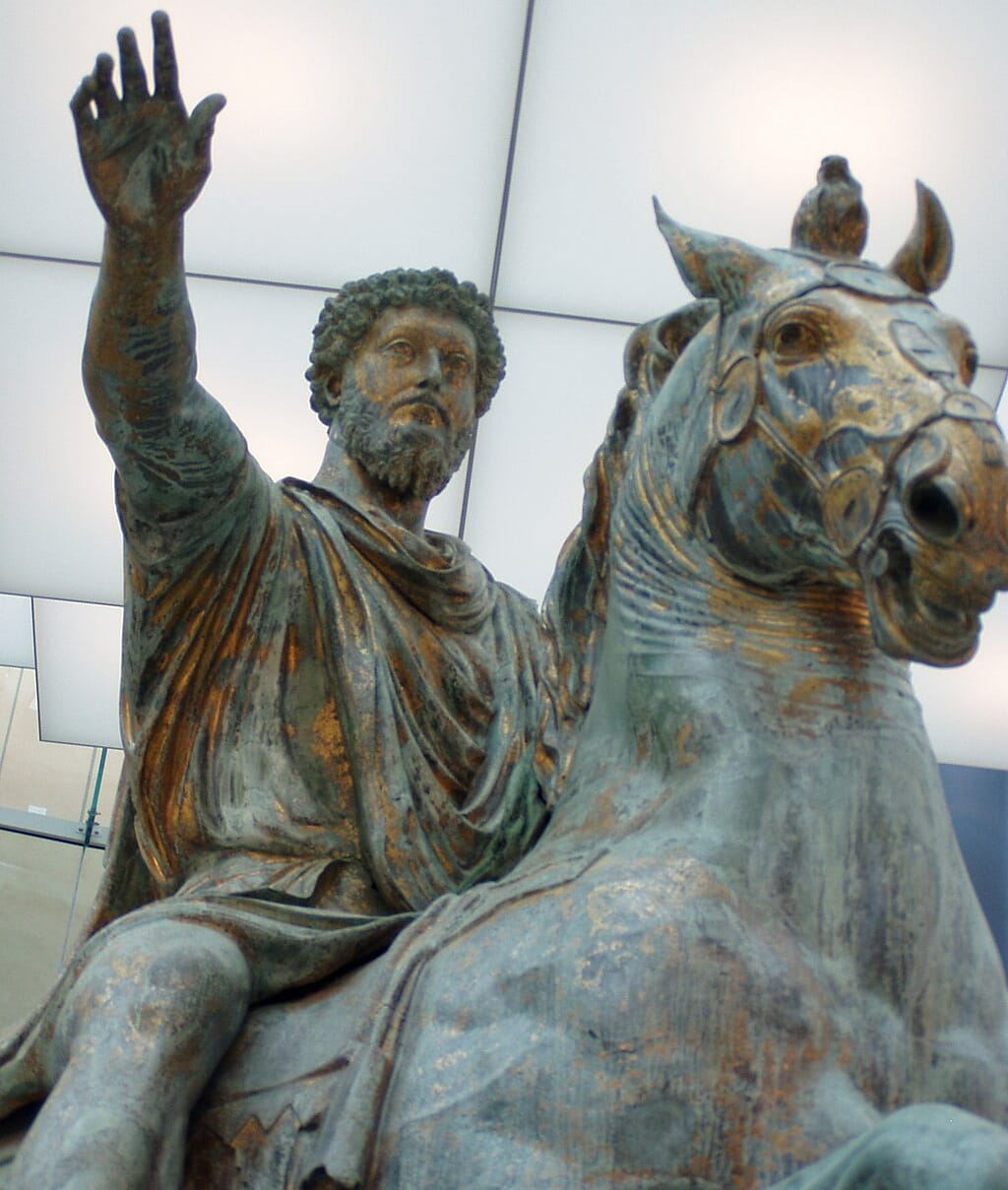5 Stoic Lessons from Marcus Aurelius That Actually Work
A modern look at five Stoic lessons from Marcus Aurelius that still work. From controlling the story in your head to accepting reality without surrendering to it, here’s how an ancient emperor can help you think clearer, live better, and stop spiraling over unread emails.

Thinking like Marcus Aurelius never fails me in difficult situations, and it may help you, too. You see, there's something magical about remembering a Roman emperor's insight to calm you down after an email from a difficult client or your boss.
Marcus was running an empire, dealing with plagues, wars, and politics that make today's political climate look like a yoga retreat, and somehow his notes to himself (written around 175 CE) still work for us, sitting in front of laptops, drowning in notifications and lactose-free oat milk. They are a perfect antidote to the chaos of modern life.
He wasn't writing for subscribers. He was wrestling with his own ego, anxiety, and distractions, which sounds a lot like me fighting the algorithm before my first coffee.
Here are five of his lessons, stripped of the togas and translated for our times.
1. You Can't Control Events, Only Your Response
Marcus was obsessed with one distinction: what you control versus what you don't. He writes: "You have power over your mind, not outside events."
I believe that you don't control your inbox, traffic, or what people think of you. But you control the story you tell yourself about those things, and that's the most important thing to remember.
If you leave this article with only one idea, make it this:
"You control the story you tell yourself."
This doesn't only stem from ancient philosophy; it's the foundation of Cognitive Behavioral Therapy. Psychologist Albert Ellis built Rational Emotive Behavior Therapy, demonstrating that our interpretations of events, not the events themselves, determine our emotional reactions.
In today's world, you send an important email and get no reply.
- Default brain reaction: "They're ignoring me. I said something stupid. I'm a fraud."
- Marcus's brain: "No reply yet. I'll proceed with the most logical assumption until I have more information."
How I use this: I treat my thoughts like drafts, not facts. When panic shows up, "This is a disaster, everyone will freak out!", I pause and ask:
- Is this true?
- What else could be true?
- What's a more accurate way to see this?
That tiny pause drains the drama out. I'm not forcing positivity; I'm aiming for accuracy.
2. Do the Right Thing When No One Is Watching.
Marcus wrote:
"At dawn, when you have trouble getting out of bed, tell yourself: I am getting up to do the work of a human being."
Remember, he was the emperor. A king of his times. If anyone could've chased external validation, it was him. Instead, every morning, he writes like someone trying to talk to himself out of his own ego.
Modern translation: We live in a world where you can do good work and feel like a failure because you only got 3 likes. Or do mediocre work and feel powerful because the algorithm smiled on you.
A few months ago, I went from an introvert with zero social media presence to a "content creator." I fell straight into the trap, refreshing analytics constantly and letting the numbers decide whether my day was a success.
Then I asked: What if I measured my day by whether I did the right things well, not whether anyone noticed?
How I use it: When working on something with no clear reward, a long-term project, or a low-traffic blog post, I ask:
- Does this align with my values?
- Is this useful to someone, even future me?
- Did I show up and do the work properly today?
The metric shifts from "Will this impress anyone?" to "Did I do it right?" Anything else is a bonus.
This matters because intrinsic motivation -doing things for their own sake- is what sustains long-term behavior change, according to Self-Determination Theory in psychology. External validation burns out fast.
Enjoying the journey so far?
If you like deep dives into creative chaos, productivity under pressure, and nerdy lessons from real-life experiments, subscribe to get future posts delivered right to your inbox. Subscribe Now
3. Remember You'll Die (In a Strangely Comforting Way)

"Memento mori", remember that you will die. Marcus uses it like a guide, not a threat. Life is short, time is limited, so we must focus on what actually matters; every minute the needle moves forward, whether we are paying attention or not.
Modern take: In a world of infinite scrolling, it's easy to live as if time were unlimited. Easy to trade whole evenings for "one more video." Easy to assume there will always be a better time to start, to apologize, to try.
But there won't always be a better time. There will just be less time.
A practical filter: I ask, "Will this still matter five years from now?"
- If yes, they are likely: Important relationships, health, meaningful work, creative projects, I keep postponing.
- If no: Petty arguments, performative outrage, every micro-distraction.
"Memento mori" isn't meant to scare you. It's there to remind you:
"Don't waste your life on things you don't really care about, and don't delay the things you quietly do."
Honestly, if I ever work up the courage to get a tattoo, it'll say "memento mori", a permanent reminder that life is short and death isn’t optional.

4. Accept Reality Fully, Then Act Wisely
Marcus doesn't say "everything happens for a reason" in the Instagram quote way. He says: Things happen. Complaining doesn't undo them. Now what?
The Stoic method:
- See clearly: "This is what's happening."
- Accept it's real: "I can't undo it."
- Ask the only valid question: "Given this, what's my best move?"
Modern example: The project is late. Your flight is canceled. A plan falls apart.
- Default reaction: "Why is this happening to me? This shouldn't be happening!"
- Stoic-informed reaction (after some swearing): "Alright, this is happening. I don't like it, but what can I still control?"
Acceptance isn't passivity. It's just not wasting energy arguing with reality. Psychologist Steven Hayes calls this "psychological flexibility" in Acceptance and Commitment Therapy; the ability to be present with what is, rather than what you wish were true.
How I use it with people: Marcus applies this to humans, too. People will be selfish, forgetful, and dramatic. Not other people. Me too.
If I catch myself getting outraged when someone acts like a human being, I pause and ask: "Knowing that no one is perfect, so who do I want to be right now? Firm? Kind? Clear?"
You don't control the script others follow. Only your lines.
5. What Hurts the Hive Hurts the Bee
Marcus reminds himself that humans are built for cooperation. He writes: "What's bad for the hive is bad for the bee."
It's easy to feel like we all live in separate worlds: personal brand, personal productivity, personal success. But we all reside in the same hive, so your habits, moods, and decisions leak into other people's lives, like it or not.
In practice:
- At the office: not pitching problems over the fence to another department and pretending they disappeared.
- Online: remembering an actual human is behind that username you're about to sh!t on.
- Every day life: building small habits of reliability and kindness, not because they look good on some imaginary character report card, but because they make life less miserable for everyone in your radius.
At times, we tend to underestimate how "small" things, such as answering politely, saying thank you, giving clear feedback instead of those tiny, hurtful remarks, can completely change the emotional energy in a room, a team, and even a family.
Stoicism gets marketed as "be tough," but Marcus is expressing something deeper, resilience isn't the finish line.
It's the foundation for living with more decency and compassion toward others.
Donald Robertson literally wrote the book on this: How to Think Like a Roman Emperor. It bridges ancient Stoicism with modern CBT, and I'm still learning from it.
Stay kind. Stay curious. Stay aligned with what matters.
If you like deep dives into creative chaos, productivity under pressure, and nerdy lessons from real-life experiments, subscribe to get future posts delivered right to your inbox. Subscribe Now
A Reality Check: I need to be honest: I'm writing this as someone with the privilege to practice Stoicism. I have stable housing, a loving and supportive family, food security, and the time to journal about my thoughts. Marcus was a wealthy, powerful emperor. Stoic philosophy is more straightforward to practice from a position of relative safety. "Control what you can control" hits differently when you're facing systemic barriers, chronic poverty, or severe mental illness. This isn't a cure-all. It's one framework that's helped me, and it might help you, but context matters. If you're struggling with anxiety, depression, or other mental health challenges, please talk to a therapist or counselor. Stoic philosophy can be a helpful tool, but it's not a substitute for professional help when you really need it.
Thank you for reading.